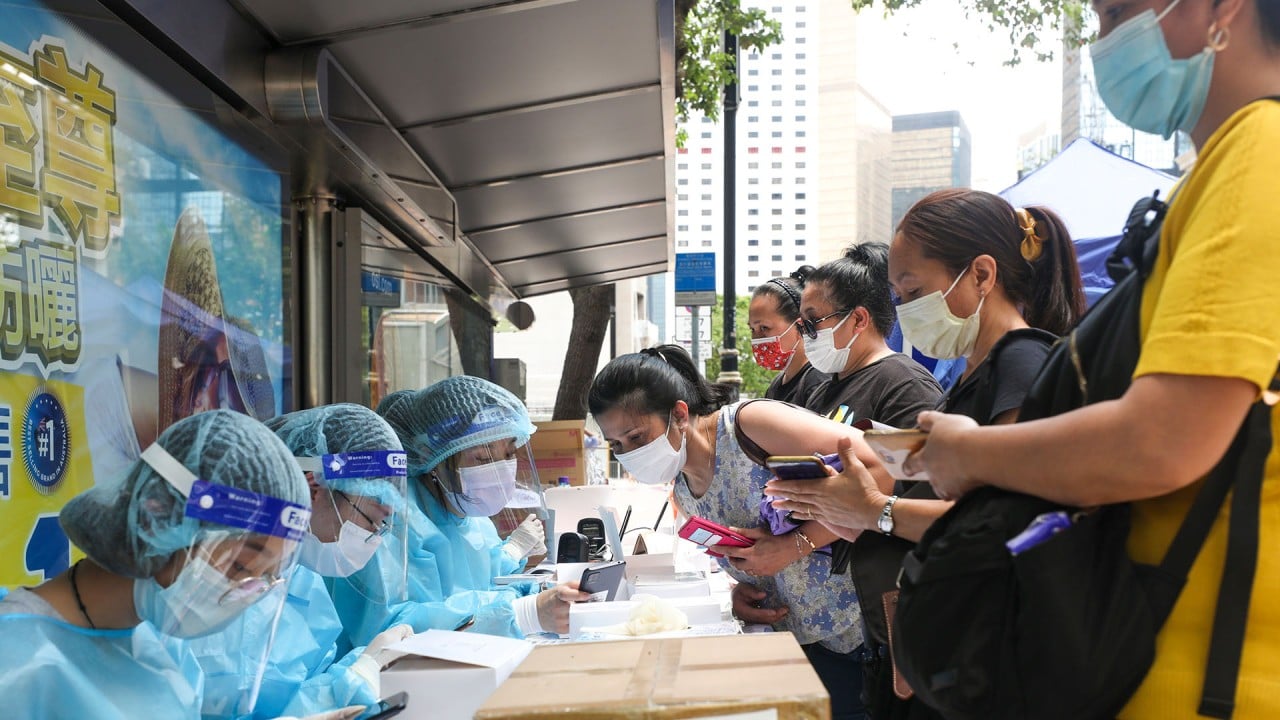
03:08
Hong Kong domestic helpers slam ‘discriminatory’ Covid-19 rules

Earlier this month, I received an email from a reader who was concerned about discrimination against domestic workers amid the coronavirus pandemic. As a member of an ethnic minority group herself, she noted that she too had “experienced racism in Hong Kong many times”.
Throughout the years, I have conducted dozens of interviews with domestic workers and advocates, highlighting the mistreatment of the city’s migrant workers.
But Covid-19 brought many new extra burdens. Amid anxieties about their own families, who are mostly in the Philippines and Indonesia, some domestic workers have been prevented from taking their days off, faced heavier workloads and, at times, even abuse. Others were fired and ended up in shelters run by non-profit organisations.

03:08
Hong Kong domestic helpers slam ‘discriminatory’ Covid-19 rules
Robert Godden, director of the communications consultancy Rights Exposure, pointed to increased discrimination during the crisis , not only “in public spaces … and with their employers, but you also saw that in the public realm”, he said, in reference to negative comments about domestic workers from politicians.
Chief Executive Carrie Lam Cheng Yuet-ngor said on May 11 that the Hong Kong government would withdraw a mandatory vaccination plan for the city’s domestic workers, which had sparked controversy. Still, she ordered another round of mandatory Covid-19 testing.
Surely the government understands that its singling out of one group sends a message to the whole of society, and will only instigate more distrust and discrimination.
“To roll out a policy for 370,000 domestic workers in the city requires a well coordinated, well thought-out and justified approach,” said Manisha Wijesinghe, executive director of the support group HELP for Domestic Workers.
But this is only the tip of the iceberg. In a recent interview, Godden echoed the opinion of many of those who have researched or provided support services to domestic workers. The discrimination they face goes well beyond isolated cases – and the coronavirus crisis. Instead, it runs deep in a city that is heavily reliant upon its “helpers”.
“The elephant in the room is racism. And there’s economics in there as well. It’s this toxic mix,” he said. “Sexism, racism, and classism.”
It’s time to acknowledge this. Some will argue that domestic workers have a better situation in Hong Kong than they do in Middle Eastern countries, say. But as a tolerant and generous city, Hong Kong can and should do a lot better than that.
As a start, social enterprises including Migrasia and EmpowerU are launching a campaign that will culminate on May 30 with a Helper Appreciation Day – envisaged as an annual event.
“Why not take a day to simply say ‘thank you’ to the domestic workers in Hong Kong who quietly allow this great city to not only function but thrive? We are all better off because they are here, and it’s time they had a day where we recognise their sacrifices and hard work,” said David Bishop, an academic who is also co-founder of Migrasia and EmpowerU.
Bishop argued that everyone can do more to improve the lives of domestic workers in the city. “Even well-meaning families often break the law or facilitate mistreatment,” he said, noting that employers should take the time to learn their responsibilities and act accordingly.
The government should also consider setting up spaces where domestic workers can choose to gather on their days off, provide them with mental health resources as well as welfare support, and launch a campaign against discrimination and racism in the city. That too would benefit thousands of Hong Kong families.